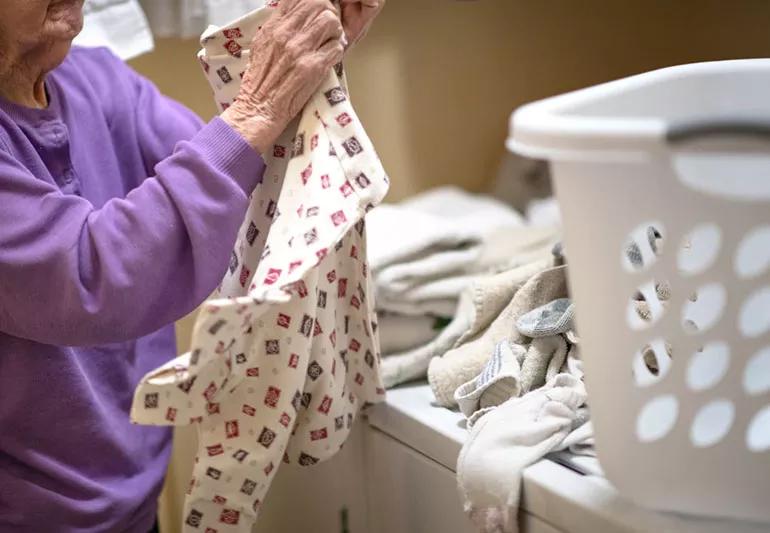If you’ve been wearing the same stuff for weeks, it’s time for a laundry intervention

Image content: This image is available to view online.
View image online (https://assets.clevelandclinic.org/transform/91ab75b4-c0d3-44f6-a66b-47aefbb1c53b/washComfyClothes1-DG-HEN_1872897-032520-770x533-1_jpg)
Woman folding her newly washed clothes
xSome of us have been stuck at home for what feels like an eternity.
Advertisement
Cleveland Clinic is a non-profit academic medical center. Advertising on our site helps support our mission. We do not endorse non-Cleveland Clinic products or services. Policy
And many of us have probably been wearing our favorite stretchy pants or well-worn tees for weeks on end. Here’s hoping that none of you are surrounded by clouds of dust and bugs like Pig-Pen from Peanuts.
All joking aside, pandemic living has made us a lot more cautious and conscious about wellness and our personal hygiene. We’re constantly washing our hands, we’re squirting everything and everyone down with hand sanitizer and we’re holding people to the six feet rule. But when it comes to your quarantine fashions, have you thought about how often you should be washing them while you’re at home or after you’re out and about?
“It all depends on your social distancing and how much you’re interacting with the outside world,” says dermatologist Alok Vij, MD. “When you’re out in public these days, you have to make the assumption that someone around you is carrying the coronavirus. And you have to take every precaution not to bring that back inside your house.”
Many of us are still braving public spaces for work or to get food and other essentials. Dr. Vij says it’s important to stay on top of your hygiene from the moment you get in your car until the time you arrive home to stop the spread of the virus. He recommends keeping sanitizer in your car so you can clean your hands after you’ve been out in public. And once you return home, be sure to peel off those outer layers of clothing, especially if you were near someone who was sneezing or coughing. You don’t necessarily have to wash them right away though.
Advertisement
“A recent study showed that coronavirus can live for 10-12 hours on metal surfaces, but on paper, about 90% of the virus dies within an hour,” explains Dr. Vij. Since fabric is porous like paper, the virus isn’t able to live as long on clothing as it does on metal surfaces.
This doesn’t mean that you should throw caution to the wind and leave your dirty clothes everywhere or even wear them in bed. Since we’re still learning new things about coronavirus every day, Dr. Vij emphasizes that it’s still a good idea to strip down and store the clothes you’ve worn out in a laundry bag, basket or even the tub of the washing machine until they can be washed.
“If you’re truly just lounging around the house and no one’s going out, and there’s not much coming in, it will depend more on the type of garments you’re wearing and how tight-fitting they are,” says Dr. Vij. Spandex items can get pretty ripe after gym workouts or a round of chores around the house. You’ll probably know after a day or two that it’s time to throw them in the washer.
Dr. Vij explains.
“Things that are tighter on your skin will have a little bit more friction against it. Therefore, these garments can rub off more dead skin cells and skin oils. Dead skin cells and oils then become trapped in the fabric and will cause it to get stinky. This can also cause other problems like body acne. So, if something is tighter fitting, wear it once. You might even be able to get away with wearing it a couple of times. But after that, toss it in the wash.”
According to Dr. Vij, sweats and jeans can go a little longer between washes. “I think it’s still fine to let sweats and jeans go for a few days as long as you’re not getting sweaty or as long as they’re not visibly soiled,” he says.
When it’s time to wash your clothes, you don’t need to soak them in hot bleach water or do anything outside of your normal routine. Dr. Vij recommends detergent and warm water cycles.
“Washing your clothes with soap and water is very effective for killing the coronavirus. It does this both through a detergent action, which physically can destroy the virus, but it also works just by getting the virus off of your clothes.”
Once you wash your clothes, machine dry them and you’re good to go. No special dryer setting is needed either. When it comes to germ prevention, the washer gets the job done so, you don’t need to dry your clothes with the highest heat setting.
Advertisement

Sign up for our Health Essentials emails for expert guidance on nutrition, fitness, sleep, skin care and more.
Learn more about our editorial process.
Advertisement
Chilblain-like skin lesions and rashes are mild (and rare) complications of many viral infections, not just COVID-19
Most can return to work or school when they’re symptom-free for 24 hours
Covering your mouth when you cough and staying home when you’re sick are a couple ways to help keep yourself and others COVID-free
This vital nutrient supports your health, but its role in COVID-19 prevention and treatment isn’t proven
Studies have shown promising results, but additional research is needed
Infection and inflammation can cause you to lose your voice and have other voice changes until you’re fully healed
A COVID-19 infection can bring on depression or anxiety months after physical symptoms go away
Just like the flu, COVID-19 continues to evolve every year with new and smarter variants
Prioritize your health by managing stress, strengthening your social connections and getting quality sleep
Bolsters, blankets, pillows and blocks can offer extra support, stability and comfort
Allergies, postnasal drip, asthma or reflux could be to blame for a cough that won’t quit